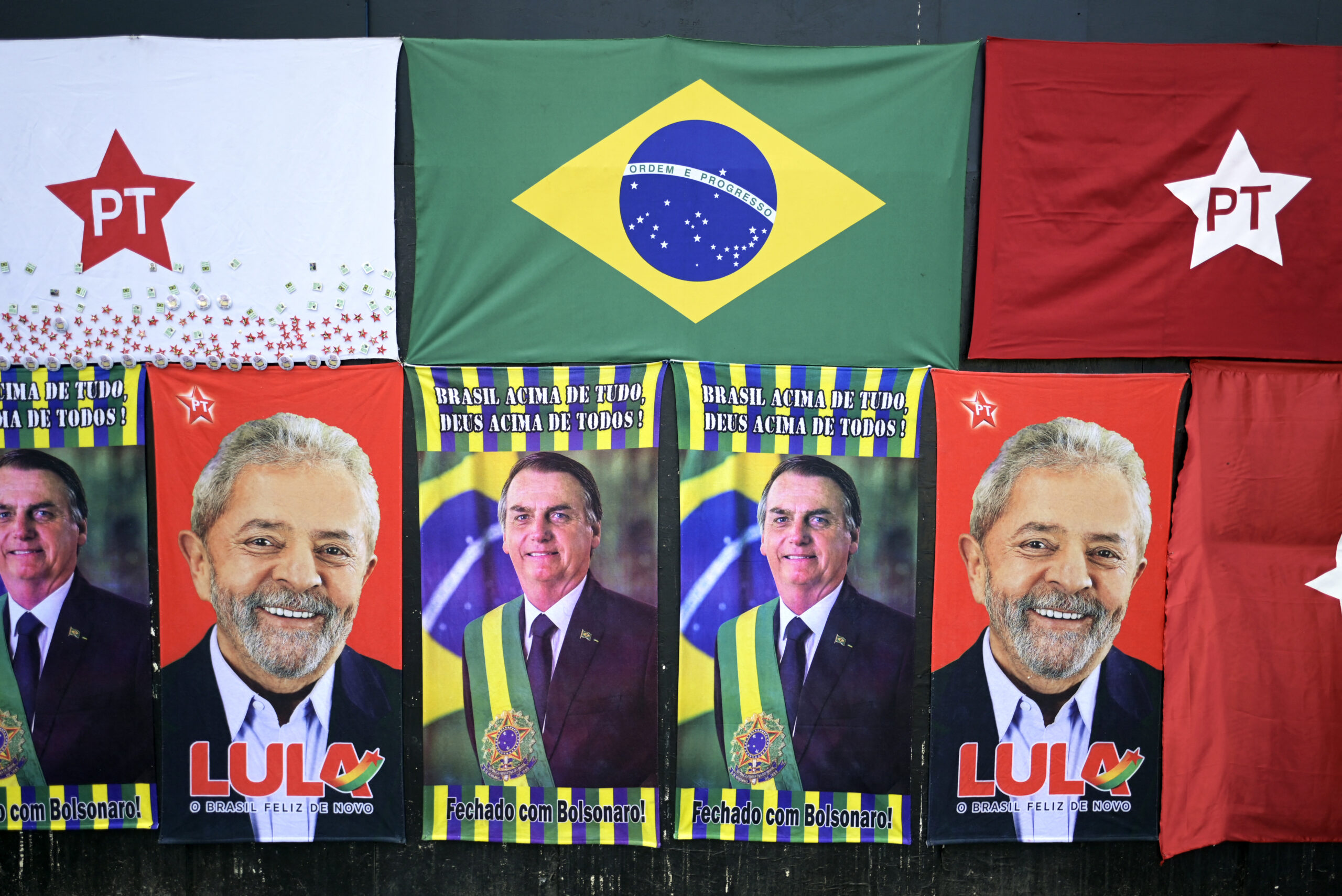International
‘Make it stop!’ Brazilians fed up with long, dirty election campaign

| By AFP | Anna Pelegri, Ramon Sahmkow, with Lujan Scarpinelli in Sao Paulo and Louis Genot in Rio de Janeiro |
Marcelo feels it is making him sick. Alexia has stopped chatting to her neighbors and Luciene is desperate for it to end: Brazil’s lengthy and nasty election duel has left many voters fed up.
Latin America’s largest nation is four days from deciding whether to re-elect far-right President Jair Bolsonaro or leftist former leader Luiz Inacio Lula da Silva, who is leading a very tight race.
The two men, both tarnished but with fervent supporters, are locked in a fierce battle for the four percent of voters who plan to spoil their vote and the one percent who remain undecided.
The candidates have flooded the media and social media with their presence, and the election has dominated conversation for months.
“I am getting sick because there is a lot of disagreement,” said 51-year-old Marcelo Brandao Viana, a Bolsonaro supporter who laments a campaign “overloaded” with “fake news” and attacks between the rival parties.
“I am living this 24 hours a day, and it is horrible,” the bank receptionist told AFP. Nevertheless, he cannot resist looking at his WhatsApp groups during his lunch break outside a mall in the capital Brasilia.
Meanwhile, on Copacabana beach in Rio de Janeiro, 65-year-old Jose Guilherme Araujo sits on a beach chair in a tight, bright green swimsuit bearing the Brazilian flag as he tries to escape the electoral noise.
“I feel exhausted. I am fed up,” the lawyer told AFP, adding he plans to spoil his ballot.
“The main television channels are only talking about the election. It is horrible. I try to watch cable to escape the subject.”
Don’t talk about politics
A final showdown between Bolsonaro and Lula had been on the cards since last year when the leftist former president had longstanding corruption charges overturned for procedural reasons, and was freed from prison, without being exonerated.
Many Brazilians feel the election campaign began then, long before voting season, especially because both candidates draw strong measures of adoration and hatred.
In Sao Paulo, Alexia Ebert put her apartment building WhatsApp group on mute after it became an endless thread of political information and disinformation.
“I couldn’t take it anymore,” said the 22-year-old student.
Some, like Aline Tescer, a 35-year-old from Sao Paulo, said that any policy proposals for the next four years are conspicuous by their absence.
“I see myself the same as in the last election. It is always the same things, the same accusations, and I feel I have no choice in who to vote for.”
Luciene Soares, a businesswoman from Brasilia, feels “disappointed” by the “disrespect” instigated by Bolsonaro.
“People are afraid. I prefer not to say who I am voting for because one is afraid of people’s reactions. I don’t talk about politics because it creates problems,” said the 48-year-old.
“Among friends and family, we say: ‘God! Make it stop.’”
Anesthetised electorate
This fatigue has not shown up in weekly election polls, but experts have picked it up on the streets and online, in this country which has 171.5 million users (80 percent of the population) on social media, according to a study carried out by the Hootsuite and We Are Social agencies.
The constant bombardment of information “ends up anaesthetizing the electorate” and “tiring them out”, said Amaro Grassi, a sociologist with the Getulio Vargas thinktank.
“The permanent presence of campaign content is not new in this election, but has become much more accentuated,” he added.
Grassi remarks that most Brazilians just want to get back to their normal lives and “turn the page” on the bruising campaign.
“Today, politics has even become a topic of conversation on gossip sites,” said Sao Paulo resident Iamylle Kauane, on a visit to Rio.
This 21-year-old social assistant is waiting for the elections to end “to return to normalcy.”
Nevertheless, some are indefatigable.
“I don’t feel tired,” said Leandro Albino Oliveira, 36, selling hats on a Rio beach.
“We will not rest until our president is re-elected.”
They have been an advocate for the rights of non-binary people since high school, and paid for a qualification in social work by selling sex.
Today, Cienfuegos is a senior figure at the Organizando Trans Diversidades (Organizing Trans Diversities) advocacy group.
Over the past decade, Chile has been moving away from the conservatism inherited from the dictatorship of Augusto Pinochet (1973-1990) and the influence of the Catholic Church.
Still, last year, 1,114 complaints of discrimination against LGBTQ+ persons were registered in Chile — 127 from transgender people — according to the Movilh gender activist group.
In 2012, Congress passed the Anti-Discrimination Act, and three years later legalized same-sex civil unions.
In 2018, a law was passed that allows for a sex change from the age of 14, and last year, Chile approved gay marriage and adoption.
In July, an appeals court in Santiago finally recognized Cienfuegos’ non-binary gender.
But the fight is not over.
Chile still does not legally recognize genders other than male or female and anyone else who would want an “X” on their ID will likely face a legal battle similar to Cienfuegos’.
“The non-binary identity card is a milestone among a range of milestones for the advancement of fundamental rights,” Cienfuegos said.
“But conservatism is about enduring daily discrimination against… sexual diversity,” they added.
In July last year, Chile’s neighbor Argentina became the first country in Latin America to allow a gender other than male or female to be listed on a person’s identity document, following in the footsteps of Australia, Canada, New Zealand and the United States among other countries.
International
Football Fan Killed in Clashes After Colombian League Match

Fans of Cúcuta Deportivo and their traditional rivals Atlético Bucaramanga clashed outside the stadium following their local league match on Tuesday, leaving one supporter dead and several others injured.
The deceased fan was stabbed, according to a senior police official in Cúcuta who confirmed the cause of death in a video statement. Local media reported that the victim was a supporter of the visiting team, Atlético Bucaramanga.
The match ended in a 2-2 draw. Authorities had banned the entry of Atlético Bucaramanga’s organized supporters into the stadium in an effort to prevent disturbances.
Despite the restrictions, violence broke out in the surrounding areas after the game. Among the injured were three police officers, an institutional source told AFP.
The incident adds to a series of recent violent episodes linked to Colombian football. The most recent occurred in December, when supporters of Atlético Nacional and Independiente Medellín clashed in the stands and on the pitch, leaving 59 people injured.
International
Missing Spanish Sailor Rescued After 11 Days Adrift in Mediterranean

The man had departed from the port of Gandía, on Spain’s eastern coast, with the intention of reaching the southern Spanish town of Guardamar del Segura, a journey of about 150 kilometers, a spokesperson for Spain’s maritime rescue service told AFP.
Search boats and aircraft were deployed on January 17, but the operation was called off on January 22 after efforts proved unsuccessful. Alerts were then issued to vessels navigating the area in case they spotted any signs of the missing sailor.
As hopes were fading, a surveillance aircraft from the European Union’s border agency Frontex spotted the sailboat on Tuesday, along with a person signaling for help, approximately 53 nautical miles northeast of Bejaia, Algeria.
A nearby vessel, the Singapore-flagged bulk carrier Thor Confidence, carried out the rescue and is expected to bring the man to an end to his ordeal when it arrives on Thursday in the southern Spanish port city of Algeciras.
Maritime rescue services shared images on social media showing a small white sailboat drifting at sea and secured alongside the much larger ship.
It remains unclear how the sailboat ended up hundreds of kilometers off its intended route or how the man managed to survive for so long alone in open waters.
International
Rubio Says U.S. Could Participate in Follow-Up Russia-Ukraine Talks

The United States could join a new round of talks this week aimed at ending Russia’s invasion of Ukraine, Secretary of State Marco Rubio said on Tuesday.
Teams from Kyiv and Moscow met last Friday and Saturday in Abu Dhabi in their first publicly acknowledged direct negotiations to discuss the peace initiative promoted by former U.S. President Donald Trump.
“They are going to hold follow-up talks again this week,” Rubio told the Senate Foreign Relations Committee. “There could be U.S. participation.”
However, Rubio suggested that Washington’s role may be more limited than during last week’s discussions, which included Steve Witkoff, the president’s special envoy, and Jared Kushner, Trump’s son-in-law.
The secretary of state indicated that progress may have already been made on security guarantees for Ukraine, one of Kyiv’s key demands in any agreement with Moscow after nearly four years of Russian invasion.
“There is one remaining issue that everyone is familiar with, and that is the territorial claim over Donetsk,” Rubio said, referring to the eastern Ukrainian region that Russia wants Ukraine to cede.
“I know that active efforts are underway to see whether the positions of both sides on this issue can be reconciled. It remains a bridge we have not yet crossed,” he added during the hearing.
Rubio acknowledged that the territorial question would be particularly difficult for Ukraine to resolve.
-

 Central America2 days ago
Central America2 days agoGuatemala seizes over a ton of cocaine hidden in flour at Pacific port
-

 International5 days ago
International5 days agoTrump-Era Defense Plan Prioritizes Border Security and Scales Back Global Commitments
-

 International5 days ago
International5 days agoBogotá and Quito Seek Dialogue After Tariffs and Power Cut Escalate Tensions
-

 International4 days ago
International4 days agoDelcy Rodríguez seeks political agreements after Maduro’s ouster
-

 International2 days ago
International2 days agoSpain’s irregular migrant population rises to 840,000, study finds
-

 International2 days ago
International2 days agoHistoric snowstorm paralyzes Toronto after 60 centimeters of snow
-

 International4 days ago
International4 days agoFederal immigration agents kill man in Minneapolis, sparking protests and outrage
-

 Central America1 day ago
Central America1 day agoGuatemala Police Arrest Prison Guard Caught in the Act of Extortion
-

 Central America1 day ago
Central America1 day agoHonduras swears in conservative president Asfura after disputed election
-

 Central America1 day ago
Central America1 day agoBukele leads public trust rankings as UCA survey highlights gains in security
-

 International1 day ago
International1 day agoDoomsday clock moves to 85 seconds before midnight amid rising global risks
-

 International1 day ago
International1 day agoWinter Storm Fern Leaves 30 Dead and Over One Million Without Power Across the U.S.
-

 Sin categoría1 day ago
Sin categoría1 day agoEight Killed in Series of Armed Attacks in Ecuador’s Manabí Province
-

 International2 days ago
International2 days agoRights group says nearly 6,000 killed in Iran protest crackdown
-

 International1 day ago
International1 day agoSpain approves plan to regularize up to 500,000 migrants in Historic Shift
-

 International2 days ago
International2 days agoVenezuela frees at least 80 political prisoners, NGO says
-

 Sin categoría1 day ago
Sin categoría1 day agoEl Salvador Launches Fourth Year of Ocean Mission to Protect Marine Ecosystems
-

 International2 days ago
International2 days agoEU launches new probe into X over AI-generated fake nude images
-

 International3 hours ago
International3 hours agoMissing Spanish Sailor Rescued After 11 Days Adrift in Mediterranean
-

 International4 hours ago
International4 hours agoRubio Says U.S. Could Participate in Follow-Up Russia-Ukraine Talks
-

 International3 hours ago
International3 hours agoFootball Fan Killed in Clashes After Colombian League Match
-

 International2 days ago
International2 days agoSevere winter storm grips U.S., leaves multiple dead as extreme cold persists
-

 International2 days ago
International2 days agoFrance debates ban on social media for children under 15
-

 Central America3 hours ago
Central America3 hours agoGuatemala President Says Starlink Terminal Found Inside Prison


























